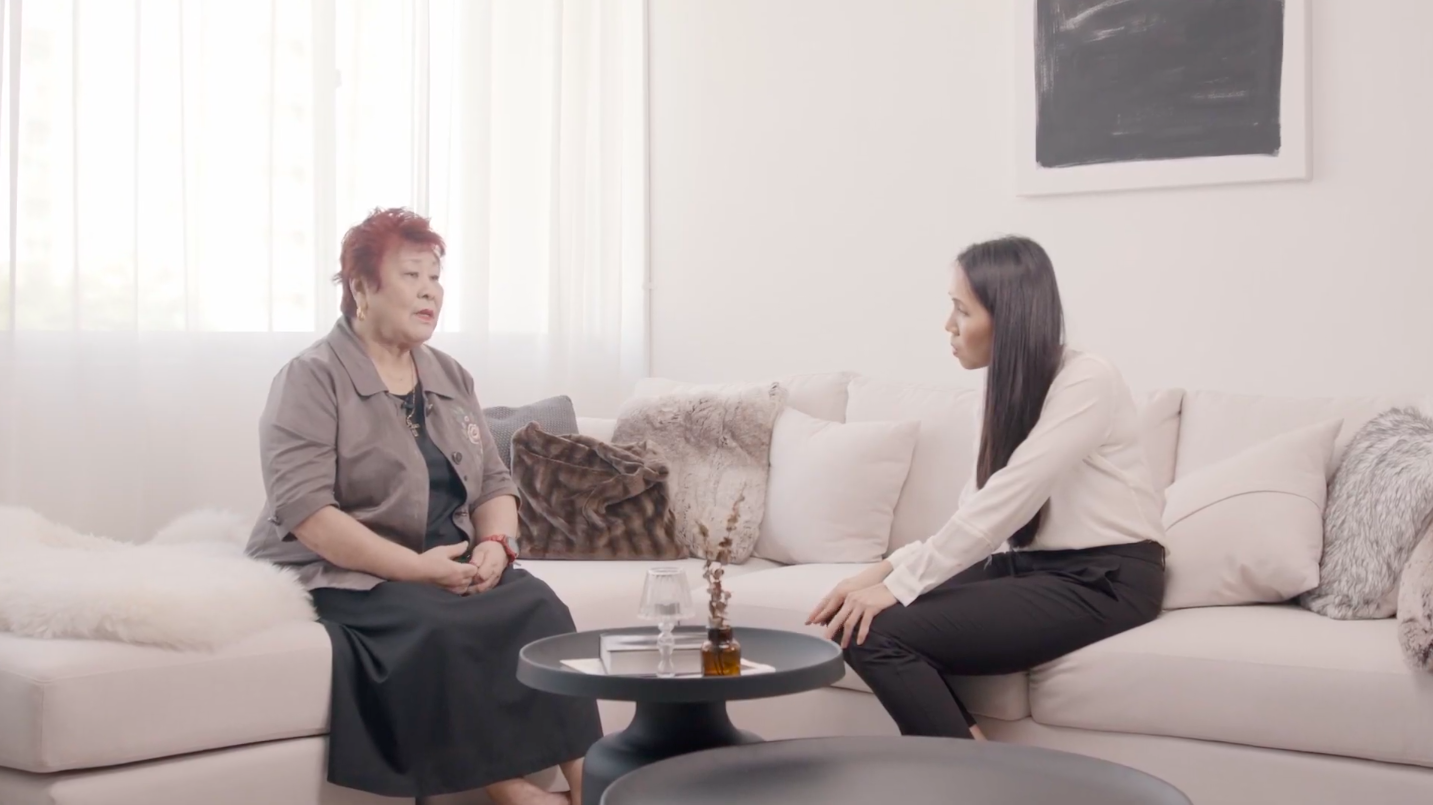7 ways to navigate sensitive and divisive topics with Christian love
by Gracia Lee // October 21, 2021, 5:01 pm

Founded by Dr Tam Wai Jia, Speak Truth In Love provides handles on how we can have difficult but respectful conversations, and also tackles medical and faith-related questions related to the Covid-19 vaccine. Screenshot from Speak Truth In Love video.
Sometimes, we can be so right that we become wrong.
In our desire to win arguments and convince others to our point of view, we may be unaware of the impact of our brash tone and words.
Even if we are proven to be right eventually, we may leave in our trail hurt feelings and strained relationships that are not always easily repaired.
We see it happening in our homes and in our friendships. And now, with social media and online message applications, the impact of combative conversations reaches even further, faster.
Remembering to respect
For Dr Tam Wai Jia, this reality was troubling as she saw believers falling out with one another over something that has been a major talking point in the past year: Getting vaccinated against Covid-19, or not.
“When I saw believers sharing their viewpoints so strongly that it distressed others to the point that people would leave chat groups and stop speaking to one another, I was so grieved,” said Dr Tam.
In our desire to be win arguments, we bulldoze our way through conversations, not realising the impact of our brash tone and words.
She noticed that misinformation had a part to play in the growing divisiveness, especially after one of her mentors shared with her that he, being medically untrained, was struggling to discern what was true amidst the copious vaccine chatter circulating online.
This is why she founded Speak Truth In Love (STIL), an initiative that seeks to cultivate a culture of empathy, authenticity and respect within the Church, while attempting to provide clarity to difficult questions around Covid-19 and its vaccine.
Supported by partners including the Biblical Graduate School of Theology and the Christian Medical and Dental Fellowship, the initiative sees Dr Tam interviewing pastors and Christian thought leaders, seniors and healthcare professionals in a series of five videos, each between five- and 15-minutes long.
The videos provide handles on how we can engage in respectful conversations with people with whom we do not agree, and also tackles medical and faith-related questions related to the Covid-19 vaccine.
For example, Kuik Shiao Yin, Executive Director of Common Ground and former two-term Nominated Member of Parliament, shares how we can empathise with others, while Dr William Wan, General Secretary of the Singapore Kindness Movement, shares his thoughts on knowing when it may be more loving to disengage.

Kuik Shiao Yin, Executive Director of Common Ground, shares with Dr Tam Wai Jia how we can empathise with people with whom we do not agree. Screenshot from Speak Truth In Love video.
Associate Professor Lim Poh Lian, Senior Consultant at the National Centre for Infectious Diseases, also answers questions about the vaccine and alternative therapies, while Senior Pastor Yang Tuck Yoong of Cornerstone Community Church searches Scripture for references on the Mark of the Beast.
“It will take gracious, wise and informed conversations to be able to generate more light than heat in such matters.”
Speak Truth In Love (STIL), which was launched last month, has already proven to be helpful to Christian communities even beyond Singapore’s borders.
Said Dr Natarajan Rajaraman, a Singaporean doctor who works in Timor-Leste: “STIL has been the best resource available to us to address uncertainties within the Christian community here and get some conversations unstuck.”
Pastor Benny Ho, Senior Pastor of Faith Community Church in Perth, added: “I am so glad that STIL has been started to help the body of Christ navigate through the thorny issues that the pandemic has brought. It will take gracious, wise and informed conversations to be able to generate more light than heat in such matters.”
The initiative is also slated to be featured at the upcoming Global Church Forum, which involves more than 30 speakers from around the world.
Choosing authenticity over avoidance
While the series addresses factual questions head-on, Dr Tam, founder of international non-profit Kitesong Global, stressed: “A key emphasis is really about creating a culture of authenticity, vulnerability and courage, rather than of avoidance, conflict and divisiveness.”

Speak Truth In Love sees Dr Tam interviewing pastors and Christian thought leaders, seniors and healthcare professionals in a series of five videos.
So, the question she sought to answer with Speak Truth In Love was: How should we navigate sensitive, and often divisive, topics in a manner reflective of God’s character?
“You see all the vitriol on social media. Love is so absent. Grace is so absent. How can Christians be that faithful presence of love?”
Dr Goh Wei Leong, a family physician and the General-Secretary for the International Christian Medical Dental Association (Southeast Asia), agreed that this is an important question to ask.
“You see all the vitriol on social media. Love is so absent. Grace is so absent. How can Christians be that faithful presence of love? How can the Christian community be a non-anxious presence in a highly anxious system?” asked the co-founder of HealthServe and advisor for Speak Truth In Love.
From the personal lessons she gleaned from her interviews for the video series, Dr Tam came up with a seven-step toolkit to help the Church navigate tough conversations, which can apply to topics beyond the vaccine.
1. Clarify your intent
Before entering a difficult conversation, ask yourself why you are doing so. Are you trying to win the conversation? Or are you trying to share your intent with love?
“I care about you, and it worries me to see you doing this.”
Take 1 Corinthians 10:24 as a guiding principle:
No one should seek their own good, but the good of others.
“If you’re going in with the intent of winning the argument, then it’s better not to do so because you’re not qualified to have the conversation. You’re going to end up hurting the other person,” said Dr Tam.
“But if your intent is to show love, to clarify that ‘I’m here because I want to love you, I want to listen and be your sounding board’, then you are qualified to have the conversation.”
To speak into someone’s life, it is important to share your sincere concern. Articulate that clearly at the start of the conversation.
For example, you may say something like: “I care about you, and it worries me to see you doing this.”
2. Be authentic and vulnerable
When we disagree on something with a loved one, it can be difficult to share honestly.
Avoiding conflict with people is often a natural instinct, but hiding our thoughts from our loved ones can create barriers.
For example, Dr Tam, who leads My Brother SG, a nationwide risk communication and community engagement initiative for migrant worker health, grappled with “very raw feelings inside of me” when she saw some people taking the outbreak measures less seriously.
“I had re-entered the frontlines though I was still breastfeeding my baby, and my husband is immunocompromised. I felt like I had risked my family’s safety and so struggled with real feelings of anger and grief,” she said, adding that not being able to process those emotions initially was distressing.
Avoiding conflict with people with differing views is often a natural instinct, but hiding our thoughts from our loved ones can create barriers, she added, as we all desire to put our authentic selves forward.
You can do so by being kind but brave to share how you feel.
For example, you can say: “I know that bringing up this topic might potentially make our friendship awkward, but I care too much about you not to raise this. I know it is a risk I’m taking, but I am taking the step of faith to trust that our friendship is stronger than this.”
3. Ask and listen intently
Ask questions and listen intently before sharing your point of view. Assure your loved ones that you are not asking out of judgment, but out of a genuine desire to understand.
Some questions you can ask are: What are your thoughts on this? What are some of your concerns? Could you help me to better understand your viewpoint?
Always use a gentle, inquisitive tone. Be genuinely curious. Paraphrase without judgment. This may, at times, require a healthy detachment to listen wholeheartedly without judgement or reacting emotionally.
4. Be aware of your emotions
Be aware of difficult emotions arising in you as you listen. Anger, frustration, grief – all these can be signposts to your underlying values.
Perhaps you feel fear for your elderly parent’s health – something you value – because they have decided to stop taking their medication. Or perhaps you feel angry and discouraged when a close friend disagrees with your parenting style, because you value being a good parent.
“We must challenge ourselves to see people in multiple realities and not just a single reality.”
Allow yourself to feel the emotions. There are no right or wrong feelings. Give yourself time, if needed, to process and interpret these emotions.
One thing Dr Tam learnt in her own journey is the need to be careful of the words and language we choose to use, even in the most private of conversations.
For example, while it is easy to refer to people who disagree with us as “these people” in a frustrated tone, choose instead to refer to them as “people who prefer …”.
“It’s in the changing of the language in the private space where God can hear us, where He hears the intent of our hearts, that we learn to truly love. We must challenge ourselves to see people in multiple realities and not just a single reality,” she explained.
5. Seek common ground
After listening, seek to establish a common ground. Is there something both of you value? In what ways do your priorities align?
For example, you may say something like: “I can see that we both place good health as a top priority in our lives.” Or “You have been a role model to me in many ways. I can see that you, like me, desire to love your neighbour as yourself.”
6. Express your emotions and thoughts in love
When in doubt, using “I think”, “I feel”, “I want/need” statements may be helpful. Use “I” statements where possible.
For example, you can say something like: “I feel worried about you because …” or “I feel discouraged by this because …”.
Be mindful of your words and tone, remembering that we represent Jesus, as it says in Colossians 3:17 (NLT):
And whatever you do or say, do it as a representative of the Lord Jesus, giving thanks through him to God the Father.
7. Wisely disengage when needed
Discern the necessity to disengage if the conversation gets heated.
You need to present the truth lovingly, but you have to give people the choice to decide what they want to believe.
Reaffirm your friendship and your desire to maintain unity in the Body of Christ.
For example, you may say: “I can see that our views on this matter are different. Our friendship matters to me and I am alright to agree to disagree. Shall we take a moment to pause?”
Said Dr Tam: “At the end of the day, you need to present the truth lovingly, but you have to give people the choice to decide what they want to believe, and that is the hard part.
“We have to trust in the Lord that whatever they choose, it is in the Lord’s hands. And then just keep them in prayer. That’s all. I think that mindset is important.”
“By this all people will know that you are my disciples, if you have love for one another.” (John 13:35)
And even if your loved one suffers negative consequences for his or her decisions, love means not rubbing it in their faces, reminded Dr Tam.
“Sometimes it’s better to be quiet if we don’t know what to say. But I do know what not to say, like: ‘See lah, see lah!‘”
Dr Goh quipped: “We must move from ‘See lah’ to ‘Selah’ (a Hebrew word found in the Psalms that can mean “to pause”), because we need to pause and think: How can I put on love in my response?”
Ultimately, we must remember that Jesus, the Source of Truth, is also the Source of Love, and love is indeed what our Christian testimony is built upon, as it says in John 13:35:
By this all people will know that you are my disciples, if you have love for one another.
IF YOU LIKED THIS STORY, READ:
Churches in Malaysia keep up 24-hour “firewall” prayer chain as Covid infections and deaths soar
Don’t let different views on vaccination divide the church: LoveSingapore chairman Lawrence Khong
Churches in Malaysia keep up 24-hour “firewall” prayer chain as Covid infections and deaths soar
We are an independent, non-profit organisation that relies on the generosity of our readers, such as yourself, to continue serving the kingdom. Every dollar donated goes directly back into our editorial coverage.
Would you consider partnering with us in our kingdom work by supporting us financially, either as a one-off donation, or a recurring pledge?
Support Salt&Light


